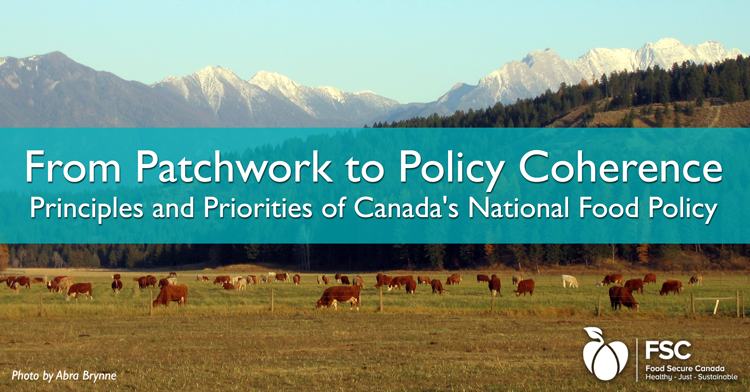From Patchwork to Policy Coherence: Principles and Priorities of Canada's National Food Policy

The federal government is expected to launch its consultation on a national food policy in the coming weeks and Food Secure Canada is releasing today a discussion paper, From Patchwork to Policy Coherence: Principles and Priorities of Canada's National Food Policy, outlining the key principles and priorities that need to be addressed as the policy is developed.
A national food policy would articulate a set of values, principles and priorities to guide food policy-making, with a clear mandate and an implementation plan across government, using all the tools that the federal government has at its disposal (policies, legislation, regulations, regulatory protocols and directives, programs, educational mechanisms, trade and investment treaties, intergovernmental agreements, taxes or tax incentives).

High rates of food insecurity and diet-related disease, coupled with declining numbers of farms and growing concerns over the state of our climate and environment point to the many contradictions and persistent challenges that need to be addressed in our food system.
With a patchwork of government policies, programmes and strategies, within multiple departments and at various levels of government, the current approach is inadequate.
However, it’s also clear that not just any old national food policy will do. We need one that is coherent, democratic, integrated and created to benefit all people.
Food Secure Canada and its members have been campaigning for an integrated and forward looking food policy for years (in 2011, FSC published Resetting the Table: A People’s Food Policy for Canada or during federal election 2015 with the Eat Think Vote campaign), and this new discussion paper offers some perspective and ideas on this historic opportunity.
 Building a comprehensive and effective national food policy requires a consideration of both process principles and policy priorities. We need a policy building process that is committed to systems-based policy making, democratizing governance, nation-to-nation relationships, and adaptive policy management for social innovation. In addition, a national food policy needs to address the following policy priorities: realizing the right to food, healthy and sustainable diets, environment and climate resilience and inclusive and equitable growth through regional economies.
Building a comprehensive and effective national food policy requires a consideration of both process principles and policy priorities. We need a policy building process that is committed to systems-based policy making, democratizing governance, nation-to-nation relationships, and adaptive policy management for social innovation. In addition, a national food policy needs to address the following policy priorities: realizing the right to food, healthy and sustainable diets, environment and climate resilience and inclusive and equitable growth through regional economies.
Rather than formal policy recommendations, these are meant as discussion starters, important themes to tackle and unpack as we move forward in the process of building a national food policy. Together these core ideas provide a path to building a healthy, just and sustainable food system that contributes to the Canadian economy and societal well-being.
Overall, we need a National Food Policy that will bring coherence to the food system by encouraging:
- Collaboration of civil society, government and private sector;
- Coordination across government departments and jurisdictions;
- Place-based adaptations to diverse geographies and contexts;
- Building on sound evidence and strong principles; and
- Innovation with support for community programs, not simply technology.
As we engage in this process, it is also crucial that we:
- Listen to those on the front lines of our food system—community volunteers and organizations, farmers, fishers, workers, municipalities, entrepreneurs—and bring them into the conversation to surface innovative solutions being implemented across the country.
- Prioritize reconciliation with Indigenous communities. Acknowledge the impact of colonialism on Indigenous food sovereignty that has robbed Indigenous communities of their access to traditional land-based foods and fishing and hunting rights.
- Recognize the multifunctionality of our food system, as it relates to the environment, the economy, health and community well-being.
 Download the discussion paper here.
Download the discussion paper here.
This Discussion Paper was written by Food Secure Canada staff and went through a review process with Food Secure Canada members. We would like to like to extend a heartfelt thank-you to all those organizations and individuals that provided helpful and insightful comments on the draft.
Want to join in the conversation? Visit Food Secure Canada’s website for updates on how to engage with our work on National Food Policy and to learn how to become an organizational or individual member.
Share your views:
- Log in to post comments
